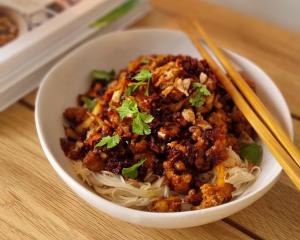When we were in England last year, I was amazed at the variety available.
In Ludlow and Church Stretton, we sampled a gourmet range of absolutely scrumptious Scotch eggs.
We bought them at farmers' markets and from upmarket delis. They were proudly displayed in shop windows, each variety named with a brief description of its contents: The Welsh Dragon (leeks and chilli), Black Watch (black pudding and onion marmalade), Scrumpy (apple and onion with sage), Piggy Renee (pork sausage and Dijon mustard), The Colonel's Secret (the colonel's own brand of herbs and spices); and the two I have reproduced here after some trial and error, Smoky Joe (a subtle combination of pork sausage with smoked bacon and paprika), and Ploughmans (a tasty mix of cheddar cheese, pickle and onion).
Scotch eggs are usually deep-fried but I never, ever deep-fry anything, so I've invented another way of cooking this absolutely delicious classic.
I bake them in muffin pans.
I wanted to add lots of the vital flavourings to the sausage meat but too much and the sausage meat enclosing the egg splits during cooking. So I've been reasonably restrained, but the flavours which give each variety its name still shine through.
I wondered about the origins of this recipe. Was it really Scottish?
It seems so quintessentially British pub food. I asked Helen Leach, emeritus prof of anthropology with a special interest in food history, if she could help.
Prof Leach searched and accessed quite a large number of online 18th-century cookbooks and none contained a recipe called Scotch eggs or a recipe of the same type with a different name. Probably the first publication was in an English cookbook, Mrs Rundell's 1807 edition of A New System of Domestic Cookery.
It wasn't until 1826 that a recipe for Scotch eggs appeared in a Scottish cookbook, The Cook and Housewife's Manual (1826), by Meg Dods. The recipe looks as if it is derived from Mrs Rundell's.
I then turned to Alan Davidson's Oxford Companion to Food.
He acknowledges that the origin of Scotch eggs is unclear and suggests it may be a descendant of a form of kofta.
Kofta, Persian in origin, refers to a range of rissoles and meatballs, usually made from pounded meat, often mixed with vegetables and spice.
Sometimes they had a stuffing of nuts, cheese or hard-boiled eggs and this was referred to as "the treasure within".
From Persia, kofta emigrated to India with the Moghul emperors and so did the hidden-treasure version.
On special occasions, nargisi kofta (narcissus meatballs) were served. These were a mixture of spiced meat wrapped around hard-boiled eggs before being cooked.
When served and cut, their yellow and white centres reminded people of the narcissus flowers which bloom in the hills in the spring.
Maybe this is the origin of Scotch eggs. But what about the name?
Why Scotch eggs?
These are good hot, straight from the oven, but I prefer to serve them at room temperature. Cut in half or quarters and serve as an appetiser or as a main course with a warm crusty ciabatta and a salad. Leave uncut and they travel well for picnics.
Ingredients
Ploughmans Scotch eggs
6 medium eggs, size 6
600g good quality pork sausages
1 tsp minced garlic
2 Tbsp chutney
2 tsp mustard powder
50g Parmesan or tasty cheese, grated
½tsp onion saltfine dry breadcrumbs, for coating
Smoky Joe Scotch eggs
6 medium eggs, size 6
600g good quality pork sausages
1 tsp minced garlic
½ tsp onion salt
1 tsp sweet smoked paprika
½ tsp prepared chilli from a jar
100g lean smoked bacon rashers, rind discarded
very finely chopped fine dry breadcrumbs, for coating
Method
Perfectly cooked hard-boiled eggs that will peel easily are not boiled. Boiling water is too hot and turbulent. The boiling water bounces the eggs around and can cause them to crack. The heat also causes the outer layer of the white to become rubbery. Difficult peeling is a characteristic of fresh eggs. The whites are inclined to stick to the shell. Choose eggs that are a couple of weeks old.
Place eggs in a saucepan, cover with cold water and heat to just below boiling point. The water barely simmers, scarcely a bubble breaks the surface. Cook for 10 minutes.
Immediately remove from the heat and plunge the eggs into cold water, icy cold if possible. This also makes the eggs easier to peel. Refrigerate the eggs and peel when completely cold.
Slit the sausage skins, peel the skin off and put the sausage meat into a bowl.
Add the garlic, chutney, mustard, cheese and onion salt, and using your hands or a fork, mix until thoroughly combined.
Preheat the oven to 180degC. Lightly oil a six-hole (regular size, 125ml) muffin tray.
Divide the sausage-meat mixture into 6 equal portions. Scoop up one portion at a time with wet hands. Place the sausage meat on the palm of one hand and flatten it out until it is about 10cm in diameter. Place an egg in the middle then carefully mould the sausage meat around the egg, keeping your hands damp.
This is quite an important step because the sausage meat needs to be fairly evenly distributed around the egg. If it is thin in places it can split during baking.
This does not affect the taste but it does spoil the appearance a bit.
Roll the sausage-coated egg in breadcrumbs to coat evenly and place in the oiled muffin tray. Continue wrapping each remaining egg in the sausage mixture and then rolling in breadcrumbs. Bake in the preheated oven for 30-35 minutes until golden. Cool a little, loosen the edges with a knife and slide out of the muffin tray.
Serve hot or at room temperature.
For Smoky Joe Scotch eggs, proceed with the recipe as for Ploughmans Scotch eggs, substituting the Smoky Joe ingredients.












